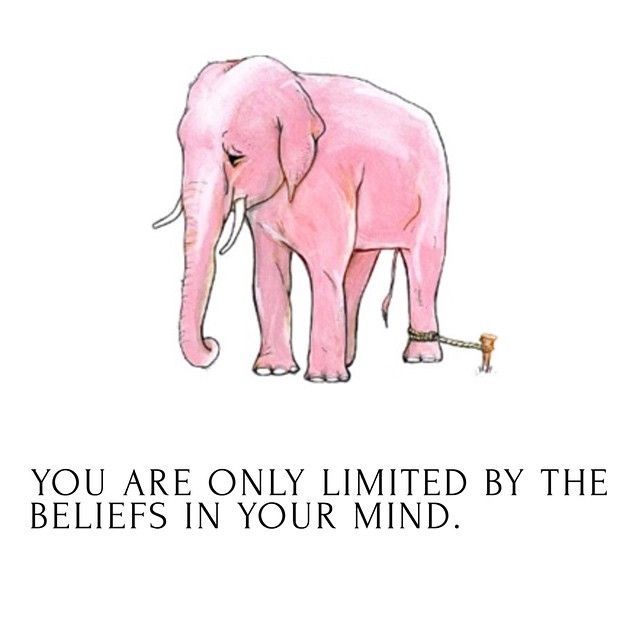Why you are more like an Elephant than you know - Take Back Your Power
You can break free because you are free - you just don't know it

Stick with me because the start of this blog may seem a little weird but this is a true story and I wrote it to demonstrate that when something happens that makes no sense, months, years later you come to realise the significance of a moment.
About 18 months ago I worked with a colleague on some blocks and whilst under hypnosis I got a scene. That scene was me as a baby elephant following my mother - told you this might sound weird.
The scene felt real and there was a belief I was not safe - needleless to say, that session would lead to me to understanding that for me to live my purpose, I needed to leave the police and become a fulltime therapist.
What happened two days ago would bring that session forward and give a new context.
Often the reason why we don't believe something is possible, is because we are blinded by our subconscious programming. Our reality is simply the result of experiences, attached to feelings which, when repeated, become who we believe we are.
Elephant Facts
- THEY CAN IDENTIFY LANGUAGES - Researchers at the University of Sussex in Brighton, discovered that African elephants can distinguish differences in human gender, age, and ethnicity purely by the sound of someone’s voice. If the voice belongs to a person who is more likely to pose a threat, the elephants switch into defensive mode.
- THEY CAN USE TOOLS - In 2010, a 7-year-old Asian elephant named Kandula impressed researchers by utilising tools from his surroundings to reach fruit that had been strategically placed just beyond his reach. After watching the fruit, tantalizingly, for a few days, Kandula had an "aha moment." He found a large plastic block, rolled it over, and stepped on it, propping himself up just far enough to reach the fruit with his trunk. While Kandula’s “aha moment” didn’t happen immediately, it stuck with him. He repeated the trick with other tools, and even figured out how to stack blocks to reach even higher.
- THEY UNDERSTAND HUMAN BODY LANGUAGE - Researchers recently observed evidence that elephants might understand human pointing. They tested this by pointing at food hidden in one of two identical containers, and observing which container a group of captive African elephants approached. Without any previous training, the elephants picked the correct container almost 68 percent of the time. That’s only about 5 percent lower than how one-year-old human babies perform on similar tests. When researchers stood between the containers and did not point, the elephants approached them randomly.
- THEY SHOW EMPATHY - A recent study observed Asian elephants comforting one another when distressed. The elephants in the study used both physical contact and vocal sounds as forms of comfort, stroking one another with their trunks and emitting small chirps. The study concluded this behavior is "best classified with similar consolation responses by apes, possibly based on convergent evolution of empathic capacities.
- THEY MOURN THEIR DEAD - It would be a stretch to say elephants, or any other animals, understand death in the same way humans do. But elephants have demonstrated fascinating reactions to the deaths of their kind, often displaying what appear to humans as symptoms of grief and mourning. They caress the bones of the dead with their trunks and will stand near the body of the deceased for hours. Sometimes they even try to bury the remains. They don't behave this way toward the remains of other animals. In this powerful photo, taken by John Chaney for National Geographic, a female elephant "very slowly and with much empathy wrapped her trunk around the deceased elephant’s tusk. She stayed in this position for several hours…"
- THEY MIMIC HUMAN VOICES - An Asian elephant named Koshik baffled researchers in 2012 when they realised he could say five words in Korean. "If you consider the huge size of the elephant and the long vocal tract and other anatomic differences—for example he has a trunk instead of lips... and a huge larynx—and he is really matching the voice pitch of his trainers, this is really remarkable," said Dr. Angela Stoeger, a lead author of a study about Koshik that appeared in Current Biology. While it is almost certain Koshik doesn’t comprehend the meaning of the words, the researchers believe he began mimicking sound as a way to bond with humans, which were his only form of social contact during his formative years.
- THEY HAVE EXTRAORDINARY MEMORIES - Elephants can remember routes to watering holes over incredibly long stretches of time and space. This is necessary for elephants that live in the desert where water is scarce. Research also shows that elephants often form close bonds with companions, and can recognize them even after long periods of separation. Dr. Shermin de Silva, now director of the Uda Walawe Elephant Research Project in Sri Lanka, said in 2011 that “Elephants are able to track one another over large distances by calling to each other and using their sense of smell … Our work shows that they are able to recognize their friends and renew these bonds even after being apart for a long time." In 1999, two elephants named Shirley and Jenny, once companions in a circus, reunited at The Elephant Sanctuary in Tennessee after more than 20 years apart. Their immediate bonding can be seen in the video above, shot during their reunion.
Source: https://www.mentalfloss.com/article/55640/7-behaviors-prove-elephants-are-incredibly-smart
So what's my point?
Are many of these things not human characteristics?
Given that premise, let me tell you about a dream I had. I don't know if I have read this, heard this or it actually appeared in a dream, but I do believe from my research this story is true.
Elephants Do the Work
In India cows are sacred so unlike in other countries they do not work the land, instead elephants do all the work, but how can these huge intelligent creatures who could easily kill a man become subservient?
When the elephants are young they are tied to a post by one leg, cruel but this is common practice and as you can imagine just like a toddler who doesn't do as they are told, they pull and try to break free, not wanting to conform by the rules. Overtime they are fed, watered and learn not to pull, because when they comply the tight noose becomes looser. They don't realise this but what they learn is the more they fight the less they get, so they trade freedom for the comfort of not being in pain.
As this process continues over weeks and months their reactions become subconscious, their trade offs, become less of a trade off, or a logic process but a subconscious knowing that to stay safe and connected the rope gives them comfort. Eventually the rope is replaced by a reed, this reed can easily be broken, but the elephant has no power. The elephants story has been changed. It now sees it's captor as someone who offers it, basics needs, food, purpose, shelter and maybe love, as many owners see the elephants as essential in doing their work.
Yet should the situation change and the elephant gets a new owner who does not provide these needs, will the elephant run back to nature, back to it's family. No it has become conditioned over time, it's story has changed.
Are you not the elephant, as a child did you not struggle until you learnt that you had to give up your freedoms in return for connection?
Are you not the elephant, who learnt that you had to give up your freedoms in return for a wage to help you live?
Are you not the elephant, who once had purpose but now feel trapped, abandoned and hurting?
Like the elephant you are powerful, you are free to run away and find a new life, a better life, but the stories you attach to the feelings you tell yourself everyday are represented by the reed around the elephants leg. The familiar feeling that keeps you trapped. Logically you should feel different, but emotionally you are trapped.
Now we don't know if the elephant was told it could change at anytime whether it would.
We don't know if it would choose faith over fear, to reconnect to it's natural state.
We do know that animals born in the wild, with help and guidance can be re-naturalised.
So if an animal can find their freedom again with the right help, what's stopping you?
Who do you need to help you find the root cause of that feeling that is keeping you trapped?
"I believe everyone should live a fulfilled and happy life and when you remove the destructive feelings you attach to the stories you tell yourself everyday, in one session and no more than three you can start your journey back to being who you were naturally created to be -
Marcus Matthews
If you want to start that journey then I've extended my offer below until the end of December, so don't be a captured elephant.
Learn what is holding you back then with my help, let me help you find freedom again - Use code
Empowered2020 and get the course for FREE











